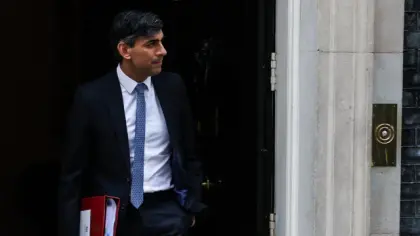Russia has charged four men it says attacked a Moscow concert hall and killed at least 137 people. Three were marched bent double into a Moscow court while the fourth was in a wheelchair. All were charged with committing an act of terrorism. The Islamic State group, or IS, said it carried out Friday's outrage at Crocus City Hall, and posted video evidence. The four were named by Russian authorities as Dalerdzhon Mirzoyev, Saidakrami Murodali Rachabalizoda, Shamsidin Fariduni and Muhammadsobir Fayzov. All appear to have been beaten - videos of brutal interrogation sessions were apparently leaked by Russian security forces, and reports suggest at least one had suffered electric shocks. The men the court identified as Mirzoyev and Rachabalizoda had black eyes and the latter's ear was heavily bandaged - reportedly from it being partially severed during his arrest - BBC
There are reports of four people injured so far from a morning Russian rocket attack on Kyiv (both rockets intercepted). One of the rockets was said to have flown at such a high speed that it only triggered air alarms at the last moment. Power outages in Odesa are expected today after another drone attack targeted critical infrastructure. Officials reported that falling missile debris had damaged a residential building. Russian drones overnight struck the southern city of Mykolayiv. The city’s mayor, Oleksandr Sienkevych, wrote on Telegram that 11 civilians were injured and several residential buildings damaged by “falling debris,” RFE/RL reported.
JOIN US ON TELEGRAM
Follow our coverage of the war on the @Kyivpost_official.
The U.N. Security Council is set to vote Monday on a resolution demanding an immediate humanitarian cease-fire in Gaza during the Muslim holy month of Ramadan. The vote comes after Russia and China vetoed a U.S.-sponsored resolution Friday that would have supported “an immediate and sustained cease-fire” in the Israeli-Hamas conflict. The United States warned that the resolution to be voted on Monday morning could hurt negotiations to halt hostilities by the U.S., Egypt and Qatar, raising the possibility of another veto, this time by the Americans. The resolution, put forward by the 10 elected council members, is backed by Russia and China and the 22-nation Arab Group at the United Nations - AP
China, Russia and Iran are fuelling disinformation about the Princess of Wales to destabilise the UK, Whitehall sources believe. Senior Government figures fear that hostile states are behind the spread of wild conspiracy theories and online rumours surrounding the Princess’s health. After the Princess announced her cancer diagnosis on Friday evening, Rishi Sunak led the condemnation of social media trolls for targeting her online in recent weeks. But his intervention did not deter further frenzied commentary, with a disinformation chief saying on Sunday that the Princess had been “revictimised” by trolls criticising her for not publicly revealing her diagnosis sooner. On Sunday, it emerged that there was growing concern in Whitehall that hostile state actors could be involved in whipping up the frenzied social media attacks on the Princess. A government source told The Telegraph: “Part of the modus operandi of hostile states is to destabilise things – whether that is undermining the legitimacy of our elections or other institutions.” It comes as Downing Street is preparing to announce fresh sanctions on China as soon as Monday, after a wave of state-backed cyber attacks against a group of senior MPs and peers - Telegraph
UK Prime Minister Rishi Sunak is to pledge new funding for the UK’s nuclear deterrent in a bid to strengthen the country’s defences against the growing threat of Russia. Britain’s defence and civil nuclear industries will receive more than £760m over the next decade – including £200m from the Government – to help create 40,000 new jobs by 2030. Defence Secretary Grant Shapps will also publish a Defence Nuclear Enterprise command paper to set out how ministers plan to modernise the country’s continuous at-sea nuclear deterrent, including the Trident missile system - I Paper
Iran’s currency fell to a record low on March 24, plunging to 613,500 rials to the dollar as Iranians celebrated the Persian New Year. Most of the shops in Tehran's main currency exchange hub were closed due to the Norouz holidays. Mohsen, an employee of one of the shops, told the Associated Press that the holiday was contributing to the plunge in the rate, giving only his first name over fear of retribution for speaking about Iran’s economic struggles. The demand for dollars is high because people travel abroad for the holidays and only a few exchange shops are open - RFE/RL
You can also highlight the text and press Ctrl + Enter



